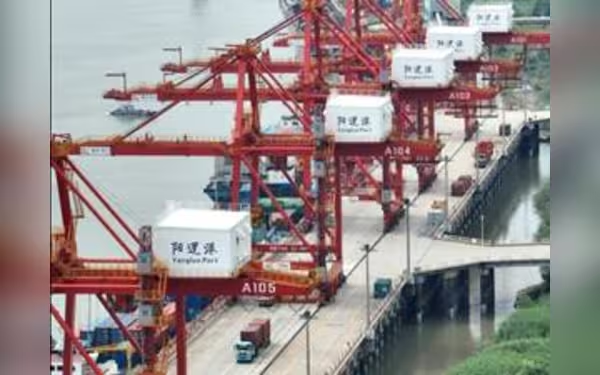Wednesday, December 4, 2024 08:03 AM
5G+ Industrial Internet Revolutionizes Traditional Industries in China
- 5G+ technology automates 50% of terminal operations.
- Over 15,000 projects underway across China.
- MIIT launches pilot program in ten cities.
 Image Credits: nation_pk
Image Credits: nation_pkThe 5G+ industrial internet is transforming traditional industries in China, enhancing efficiency and productivity across various sectors.
In recent years, the integration of advanced technologies into traditional industries has become a focal point for many countries, particularly China. The advent of 5G+ industrial internet is revolutionizing how industries operate, making them smarter and more efficient. This new infrastructure combines high-speed 5G technology with industrial applications, allowing for seamless communication between machines, systems, and people. As a result, industries are experiencing significant improvements in productivity and cost-effectiveness.
At the Wuhan CSP Terminal Co Ltd, located along the bustling Yangtze River, a remarkable transformation is taking place. The terminal, which once relied heavily on manual labor, has now automated 50 percent of its loading and transportation processes. Chen Xiaomian, the production and operations manager, proudly states, "We only need 12 workers to remotely handle a workload that typically requires 39 workers at a traditional terminal." This shift not only enhances efficiency but also showcases the potential of 5G+ industrial internet in streamlining operations.
The Ministry of Industry and Information Technology (MIIT) in China has recognized the importance of this technology. By connecting various elements of the industrial ecosystem, 5G+ industrial internet is paving the way for a digital, networked, and intelligent future. Industries such as steelmaking, equipment manufacturing, mining, and port logistics are already reaping the benefits of this technological advancement. For instance, in Hegang, a city known for its graphite mining, operations have shifted from extensive exploitation to meticulous planning, thanks to remote monitoring and data analysis.
As of now, over 15,000 5G+ industrial internet projects are in progress across China, covering all major industrial categories. This widespread adoption is a testament to the country's commitment to becoming a leader in smart manufacturing. Zhou Ji, an academician with the Chinese Academy of Engineering, emphasizes that 5G+ industrial internet is the driving force behind this transformation, reshaping not only technology but also industrial models.
To further accelerate this shift, the MIIT has launched a pilot program for 5G+ industrial internet in ten cities, including Nanjing and Wuhan. This initiative aims to foster large-scale applications and develop 5G-powered industrial clusters that can set benchmarks at both regional and national levels. Chen Ronghui, deputy head of the National Data Administration, has assured that the administration will continue to push for digital transformation in traditional industries.
Looking ahead, experts like Shang Guangyong, chief technology officer of Inspur Yunzhou Industrial Internet Platform, believe that tailored solutions for companies will be crucial. He also advocates for reducing prices on 5G-based hardware to make these technologies more accessible. As smart factories continue to emerge, the potential applications of 5G+ industrial internet are vast, ranging from smart sensing to real-time analysis and precise control.
The rise of 5G+ industrial internet marks a significant milestone in the evolution of traditional industries. As companies embrace these technologies, they not only enhance their operational efficiency but also contribute to a more sustainable and innovative industrial landscape. The future looks promising, and as more industries adopt these advancements, we can expect to see a remarkable transformation in how goods are produced and delivered worldwide.












